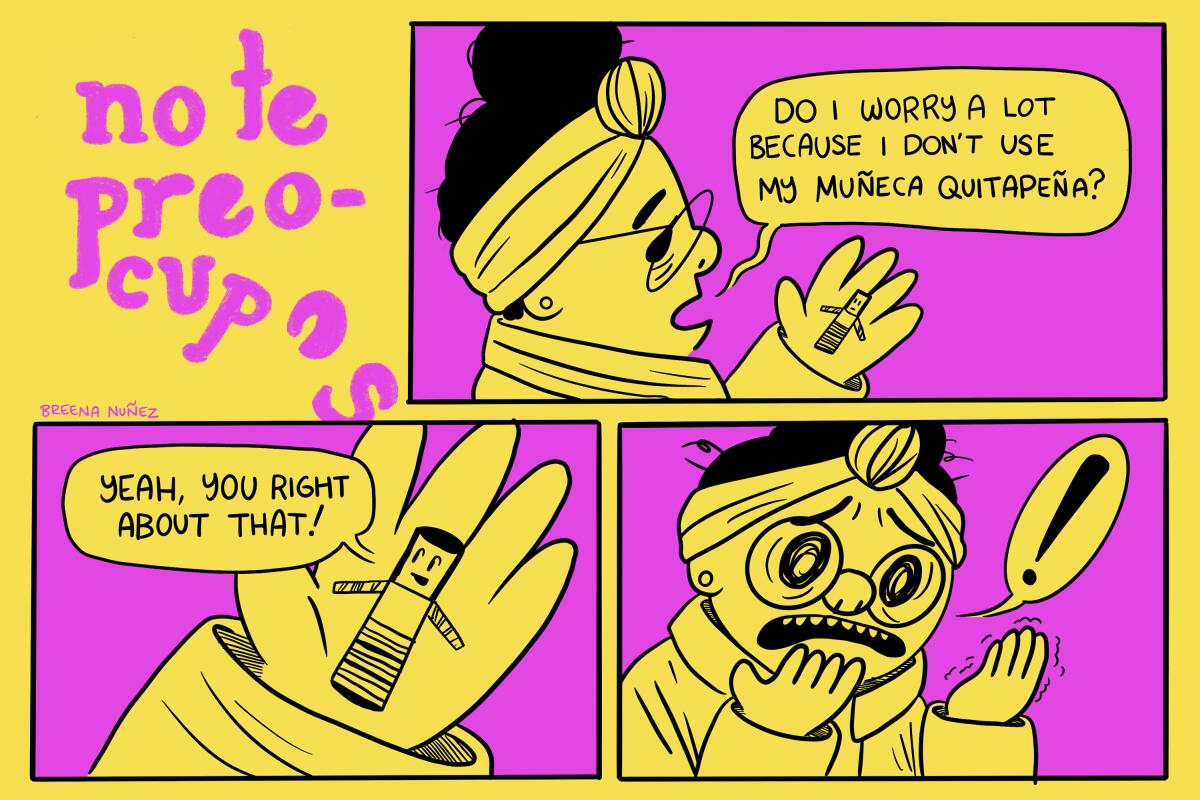Latinx Files: The rise of the Latinx creator

- Share via
This week, the Los Angeles Times published two stories on Latinx creators that caught my attention.
The first was written by Suzy Exposito and focused on the mainstream success of music podcasts like “Ídolo: The Ballad of Chalino Sánchez” and “LOUD: The History of Reggaeton.”
The second was written by technology reporter Brian Contreras and focused on the Latinx TikTok house Familia Fuego.
What I love about these stories is that they validate a fundamental belief shared by those involved in the production of this newsletter: There is an audience hungry to consume media that center on us.
(The Latinx Files is a group effort, and I’d like to give a shoutout to my editor Angel Rodriguez, our creative director Martina Ibañez-Baldor, and multiplatform editor Elvia Limón, who makes sure this newsletter makes it to your inbox every Thursday.)
“We’re bringing to life so many stories from Latinx writers who typically wouldn’t have their ideas developed by Hollywood, because they wouldn’t be taken seriously despite the huge audience demand for Latinx content,” says Camila Victoriano, co-founder of Sonoro, which co-produced “Ídolo” with Futuro Studios.
She’s not wrong about the demand.
When “Ídolo” came out, my Twitter timeline was filled with tweets praising the podcast for telling the fascinating story of a performer so iconic he’s referred to simply by his first name. It was one of our stories told exactly the way it should have been told.
The Latinx experience chronicled
Get the Latinx Files newsletter for stories that capture the multitudes within our communities.
You may occasionally receive promotional content from the Los Angeles Times.
And while TikTokers like Alexia Del Valle and Leo González might not be huge stars, their videos are shared by millions of people who see themselves in them. (Case in point: that feeling when you wanted Bad Bunny tickets but couldn’t afford them.)
“Our demo is here,” González said of Los Angeles, where the Familia Fuego house is located. “Whenever we go to any sort of public place where it’s Latinos … we all have people there who know us.”
There’s value in that recognition. As Brian notes in his story, the Latinx content house is partially funded by DirecTV. What these TikTokers give the telecommunications company is access to a demographic that’s “notoriously hard to reach through traditional channels,” according to chief marketing officer Vince Torres.
It’s easy to feel discouraged about the lack of Latinx representation in media, but these types of stories offer a semblance of a silver lining. They highlight that there is indeed a path forward.
“Latinos can make successful products, and we can make successful products about Latinos,” said Gustavo Arellano, Times columnist and host of the Ambie-nominated “The Times” podcast.
“So let’s invest in our stories.”
Consider subscribing to the Los Angeles Times
Your support helps us deliver the news that matters most. Become a subscriber.
Latinx diversity at the L.A. Times
On Friday, the Los Angeles Times released its internal diversity report to staffers. Between the period of June 2020 to August 2021, the Latinx representation in the L.A. Times newsroom went up by 12%. When you factor in staffers from Times Community News, L.A. Times en Español, and the L.A. Times Fellowship (formerly known as Metpro) that overall increase is 2% — it’s worth noting that The Times did not have a 2021 Fellowship class. We now account for 17% of the editorial staff. According to the U.S. Census, Los Angeles is 48.5% Latinx.
I am told a version of the report will be made public soon, so be on the lookout for that. I reached out to Angel Jennings, assistant managing editor for culture and talent, for comment. Here is what she said about the report:
We made some progress, but we did not make the monumental progress we hoped to make. In 2021, we were still facing a pandemic and a loss of ad revenue. The total newsroom lost 14 jobs. Still we increased Latino staff a little by 2%. We also provided pathways of opportunities for staffers to get higher job classifications and pay, and we did not backfill some of those roles in our community papers — that impacted our overall number. That shows the challenges we face as a company, not uncommon in the industry. As we hire more people, we will continue making progress. We see more jobs opening this year than we did last year. We can do better. We know that we are going to do better.
If you are interested in a job at The Times, you can find the listings here. I also reached out to the L.A. Times Guild Latino Caucus. Here’s what the group said:
Every day, Latino journalists at the L.A. Times are doing incredible work expanding coverage of our communities. But the company still has a long way to go before our staff fully reflects Los Angeles, which is half Latino.
In 2020 the company made a promise, in response to actions by the L.A. Times Guild Latino Caucus, that in five years it expected to “achieve a newsroom where Latinos make up one quarter of our staff.”
The numbers released last week show that we’re not on track to meet even that modest goal.
The L.A. Times must do better.
Things we read this week that we think you should read:
— On Tuesday, Gov. Gavin Newsom nominated Patricia Guerrero to serve as an associate justice on the California Supreme Court. If confirmed, she would become the first Latina to sit in the state’s highest court.
— I’m not the music festival type, but did you see the lineup for the recently announced Besame Mucho Festival taking place at Dodger Stadium in December? From Los Angeles Azules to Zoe, the fest feels like it’s trying to capture the music of our childhoods. LAist has the story for more details.
— On Tuesday, former Honduran President Juan Orlando Hernández was arrested at his Tegucigalpa home after U.S. prosecutors named him as a co-conspirator in a drug smuggling case and requested his extradition. Read this report by my colleagues Kate Linthicum, Tracy Wilkinson and Paulo Cerrato to learn more on the downfall of a Central American leader once lauded by U.S. officials.
— TelevisaUnivision has unveiled the name of its new Spanish-only streaming service. It’s Vix. No word yet on whether the streamer will have the same curative properties that Vick’s does.
— Times columnist Jean Guerrero wrote about the Biden administration’s plan to turn the border into a dystopian nightmare full of robot dogs.
— The Los Angeles City Council has voted to rename a street in Boyle Heights after legendary ranchera singer Vicente Fernández despite some opposition. The homie Andrew J. Campa, the tallest Mexican at The Times, wrote last week about why some community members were against the street renaming.
And now, for something a little different...

Breena Nuñez is a cartoonist and part-time professor living in San Francisco. She creates diary comics that often explore themes surrounding the awkwardness of racism, being a queer Afrodescendiente from the Bay Area and understanding what it means to be a Central American from the U.S.
“I decided to draw a joke I tell myself whenever I feel anxious. I grew up collecting muñecas quitapeñas, but I would play with them as toys without realizing their actual healing properties until I was much older.”
Are you a Latinx artist? We want your help telling our stories. Send us your pitches for illustrations, comics, GIFs and more! Email our art director at martina.ibanezbaldor@latimes.com.
The Latinx experience chronicled
Get the Latinx Files newsletter for stories that capture the multitudes within our communities.
You may occasionally receive promotional content from the Los Angeles Times.







